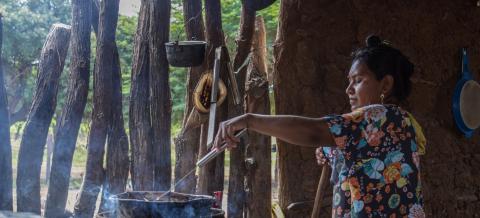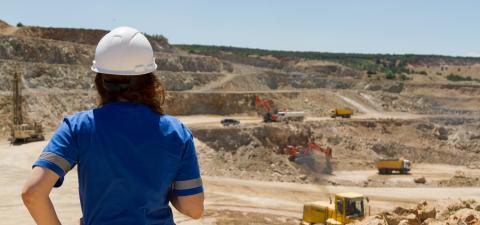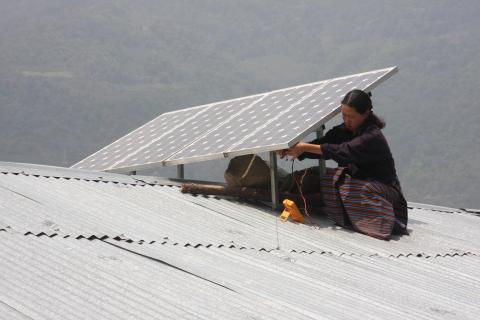
Pressing for progress on gender inclusivity in the extractive sector
A recent partner event explored tools and strategies for advancing gender inclusivity in the extractive sector
On International Women’s Day, the United Nations has urged us all to reflect on the role of women in economic development, under the theme of ”Count her in”. While there are ongoing efforts to achieve gender equality, the extractive sector lags behind in terms of female participation, despite research suggesting that economic performance can improve with greater representation. It is therefore crucial to explore tools and strategies to promote gender inclusivity in this sector, for the benefit for all.
Raising the bar
In 2023, the EITI took a step forward by integrating additional gender-specific provisions into the EITI Standard. These serve as instruments to catalyse change and empower decision-makers. All companies operating in the extractive sector in EITI implementing countries are now mandated to disclose their consultations with communities and indicate how those consultations included women. They must reveal the gender-specific benefits accruing from extractive revenues, provide detailed gender-disaggregated employment data, and furnish environmental, social and gender impact assessments. Additionally, companies supporting the EITI are required to articulate policies on gender diversity and report employment data broken down by gender.
Why are these disclosures critical? They guide policymakers and companies in formulating tangible strategies to enhance employment opportunities, mitigate adverse impacts of extractive activities on women and gender-diverse communities, foster inclusive decision-making, and ensure transparent revenue management.
While there are ongoing efforts to achieve gender equality, the extractive sector lags behind in terms of female participation, despite research suggesting that economic performance can improve with greater representation.
A recent partner session at the EITI Board meeting shed light on the EITI’s new gender requirements and facilitated discussions among diverse participants on measures to enhance gender diversity in the extractive sector.
Integrating women’s perspectives into mine design
Nirvana Mujtaba, representing Oxfam Canada, highlighted a new guide for gender-based analysis and provided a compelling argument for gender impact assessments (GIAs), which can enhance social license to operate in mining communities. To have the most impact, GIAs should be undertaken before construction of a mining project begins. Busting some common myths about the complexity of GIAs and their purpose, Nirvana presented a case study from British Colombia to show how GIAs can help redirect resources in ways that mitigate the impact of operations on women, and surface issues that would not necessarily be identified in the absence of such a process.
GIAs can help redirect resources in ways that mitigate the impact of operations on women.
Leslie Woolcott, representing the Mining Industry Human Resources Council, shared data related to women, Indigenous peoples and newcomers in Canada’s mining sector, including on women’s participation by occupational category and post-secondary school enrolment by mining-relevant fields. The analysis highlighted data gaps such as intersectional information. Drawing from data, she underscored the persistent challenges hindering the meaningful participation of women and equity-deserving groups in the industry, while also highlighting strategies to address these disparities.
Ben Chalmers, of the Mining Association of Canada, shared examples of operational changes made to the Towards Sustainable Mining Standard (TSM) to include new requirements on equity, diversity, inclusion and respectful workplaces, with a focus on psychological safety. Many of these new requirements highlight how mines can implement effective policies and practices that enable women to participate more actively in the sector. Critical to the success of these new additions to TSM is the use of data for effecting change, as well as the assessment of effectiveness of actions and targets specific to the workforce in each setting.
Ege Tekinbas, from the Intergovernmental Forum for Mining, Minerals, Metals and Sustainable Development (IGF), emphasised the transformative potential of more granular data in policymaking. Noting the importance of facilitating the collection and analysis of gender-disaggregated information, she further underscored the crucial role of robust policies in driving meaningful change within the extractive sector, including roles for women and equity-deserving groups in the full range of careers available in the sector.
Transparency is a feminist issue.
Aubrey Menard, representing Oxfam America, rounded off the discussion by highlighting the urgent need for legal and policy changes to support the implementation of the EITI’s new requirements. Drawing on Oxfam's experience, she argued that “transparency is a feminist issue”, in that transparency can lead to equal access to information and underscores the importance of consultation.
Next steps
During 2024, the EITI will work to increase the participation of women and diverse groups in EITI implementation, aiming for a more consistent approach to the adoption of reporting requirements on gender. Working with partners and existing networks, the EITI aims to develop and share approaches to policies, data use, reporting and consultation processes, where these have inspired change.
Supporting an inclusive extractive sector
Our policy brief outlines how stakeholders can use data and dialogue to promote a gender-responsive energy transition.





